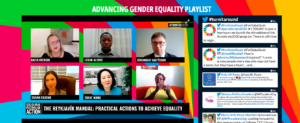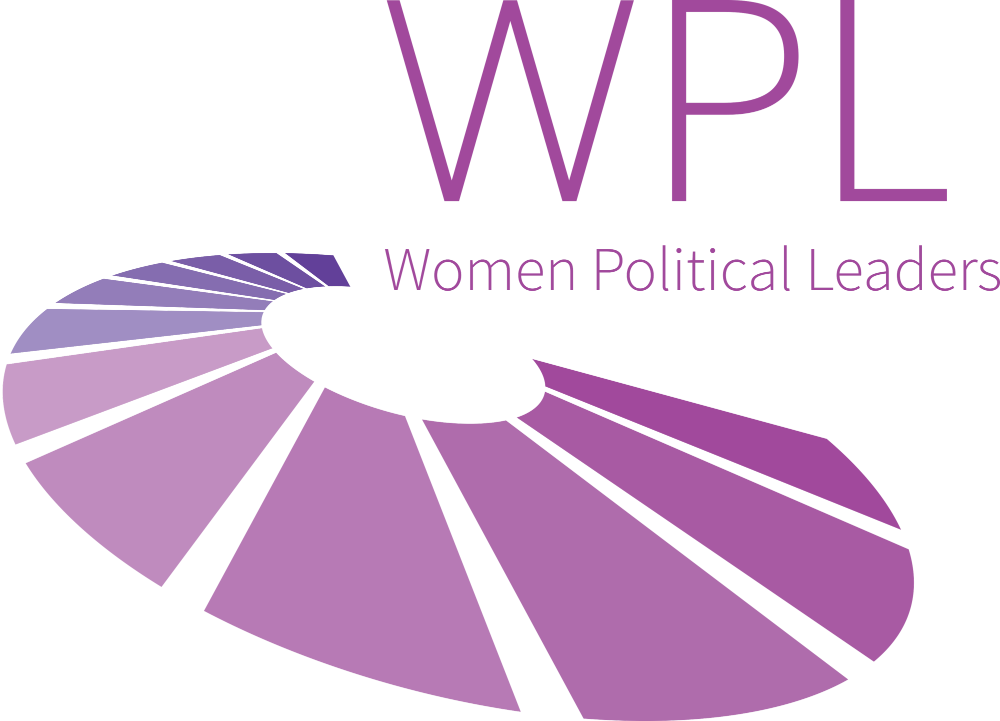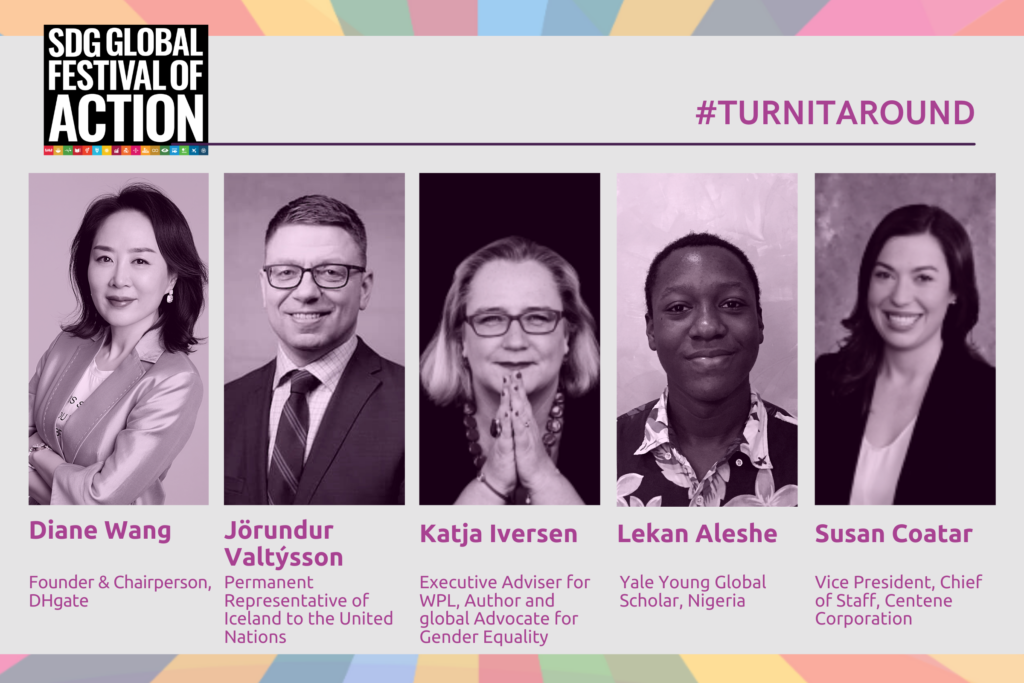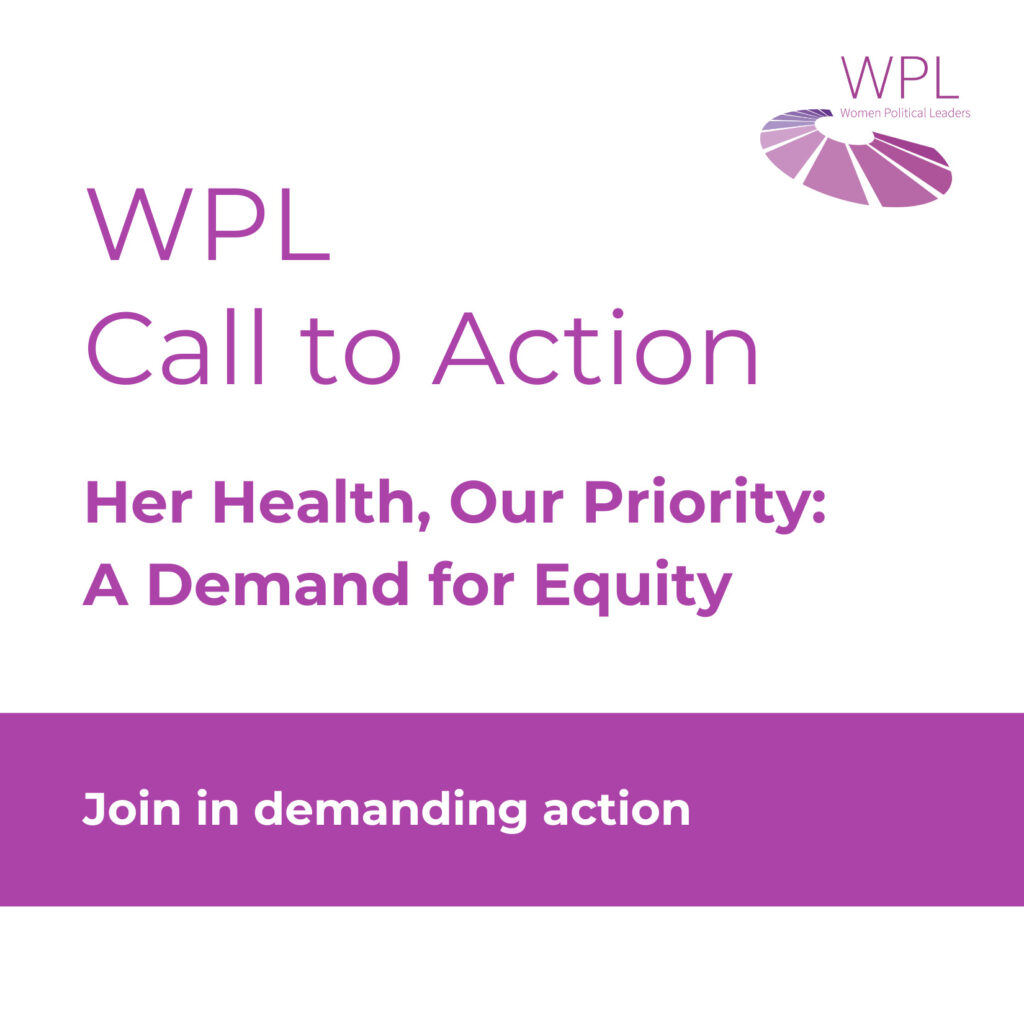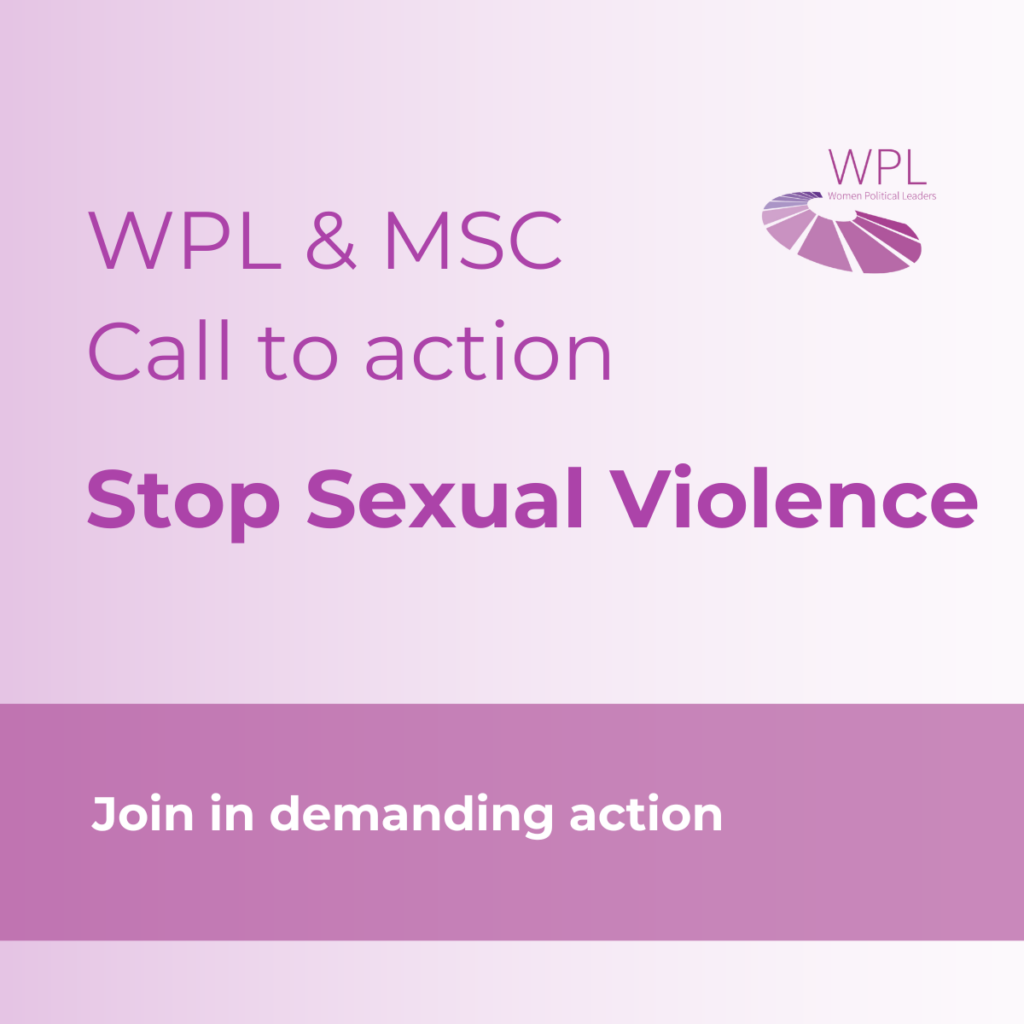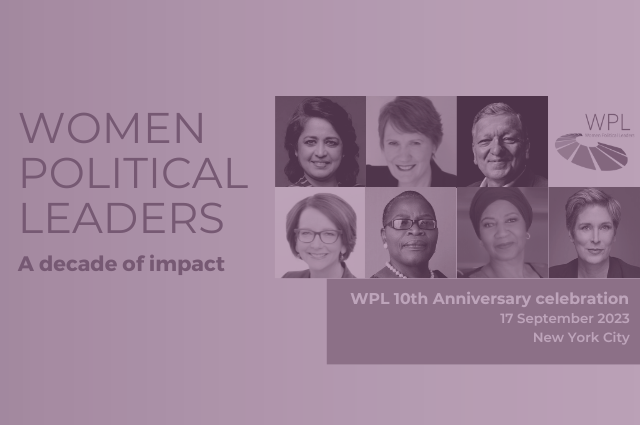The COVID-19 pandemic has deepened pre-existing inequalities, exposing vulnerability in social, political and economic systems, taking a toll on women and girls around the world. The disproportionate negative effects illuminates the critical element of a global response and recovery, with women being at the center in all forms of decision making.
Grappling with the repercussions of a global health crisis, the annual Reykjavík Index for leadership found that society has not become more progressive in how it views women in leadership. Addressing the absence of progress, the SDG Global Action Festival extends the discussion for leaders to share tangible ways to accelerate the journey toward equality.
As integral contributors to the SDG Global Festival of Action, Women Political Leaders (WPL) hosted a virtual panel discussion, The Reykjavík Manual: Practical actions to achieve equality. Moderated by Katja Iversen, Executive Adviser for WPL, the session provided actions and solutions by leaders around the world to advance SDG 5 on Gender Equality, as outlined in the Reykjavík Manual.
The session provided the opportunity to share with leaders from across sectors the aims of the Reykjavík Manual, focusing specifically on the solutions synthesised thus far to advance SDG 5. In return, the participants shared practical examples and insights on what the solutions in the Manual mean for them, as well as ways to implement them into each sector of society.
Katja Iversen remarked, “It’s personal, confront your own biases, overcome them, be a role model, and share your personal stories…It’s also political, it gives examples of what needs to be done politically. Establishing family friendly policies, including parental leave for all parents and getting rid of discriminatory laws.”
Turning it around for gender equality, the panel of leaders exhibit the practical actions from the Reykjavík Manual through policy initiatives, personal development, and community engagement.
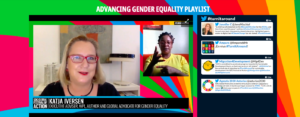
Recovery Through Digital Inclusion
Statistics have shown women are losing more jobs than men during the COVID-19 pandemic. With limited access to digital tools and platforms, women owned businesses have been especially impacted.
According to Diane Wang, Founder of DHGate, “Digital tools are a perfect solution to address gender inequality and also create an equal environment for all.”
With the rapid digitalisation, stimulated by the pandemic, the importance of digital inclusion has never been more clear. One of the action points identified in the Reykjavík Manual is to offer funds to support digital training for women.
To achieve hands on skills and entrepreneurial tactics, Diane Wange said, “We need to fully utilise our role to unite all stakeholders, including business leaders and governments, to provide sufficient training for all.”
To make sure that women are supported and treated equally from recruitment to retirement, the Reykjavík Manual advises transforming the employee experience.
Embracing this action point, government and industry leaders must incorporate “sharing, practicing, and awarding” into their initiatives. By sharing the practices and resources of women leaders, young women and girls can be inspired to pursue their dreams. To build an inclusive infrastructure, women must be provided with the tools and platforms for practice.
As Wang remarks, “Awarding is essential to women’s empowerment, we need it to discover those rising stars and recognise their efforts.”
DHGate’s efforts to build an inclusive and gender equal future has been demonstrated in the Women Connect Global Summit, a global seminar for women leaders and entrepreneurs to share their best practices and resources.
Reflecting on the importance of collective action in building a sustainable future, Ms Wang said, “We must walk the talk, to get the public and private sectors on board to promote sharing, practicing, and awarding women so that no will be left behind.”
Diane Wang’s sponsorship of digital training and leadership in the employee experience at DHGate are indicative of the tangible solutions the Reykjavík Manual offers to achieve SDG 5.
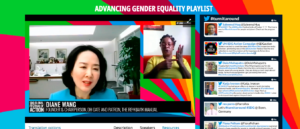
Championing Equal Representation in Iceland and Abroad
Participating in the panel discussion was Jörundur Valtýsson, Ambassador and Permanent Representative of Iceland to the United Nations, providing his perspective and role as a male political leader in advocating for SDG 5.
Outlined in the Reykjavík Manual, championing equal representation in government motivates other women to enter politics themselves.
Although Iceland has ranked at the top of the World Economic Forum’s Global Gender Gap Index for 11 consecutive years, Ambassador Valtýsson insists there is “still work to be done.”
He commented, “It is important to be open to methods and strategies that promote higher participation for women in leadership, and to continue to share lessons and best practices. The Reykjavik Manual is an excellent tool in this respect.”
In 2019, the UN adopted the resolution, led by Iceland, to have International Equal Pay Day be observed each year. For Ambassador Valtýsson, implementing gender equality initiatives and policies is “smart.”
He stated, “Equal representation and active women participation in politics contributes positively to the economy, more inclusive policy making, and contributes to effective leadership. It also shows that women in the international mediation and peace processes contribute to effective results in long lasting peace.”
With less than 10 years to achieve the sustainable development goals, outlined in the Decade of Action, the Reykjavík Manual will be a vital tool in helping leaders and their communities to build back better. An action point of the Manual endorses family friendly policies for all parents.
Demonstrating how effective policies can be used to reduce gender inequalities, Ambassador Valtýsson said, “[Iceland] introduced some specific initiatives, such as equal pay and affordable day care. We also also introduced gender quotas, paid parental leave, and subsequently inclusive paternity. These initiatives have proven very successful in reducing inequalities and have also benefited men.”
As a male political leader, Ambassador Valtýsson remarked on his unique role in promoting lasting engagement and cooperation, as well as being an agent for change.
He concluded, “Male leaders have a special responsibility to ‘get with the program’ and cultivate a new normal, where inclusive decision making processes and more equal political representation really becomes the rule.”
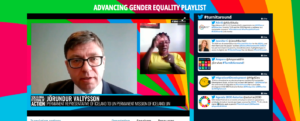
Filling the Talent Pipeline With More Women
Among the action steps laid out in the Reykjavík Manual, it points to filling the talent pipeline with more women. At Centene Corporation, 75 percent of the workforce is women. Discussing the company’s success in fostering a gender inclusive workforce was Susan Coatar, Vice President of Centene Corporation.
Centene has been intentional about the people they hire, making it a priority to build a diverse pool of applications.
Referring to the company’s internship program, “We need to make sure that in our communities the areas that we are living and working, that women and girls, people of color, have opportunities to gain the skill sets that we’re looking for,” said Coatar.
With 54 percent of the intern class being women, Centene offers tangible learning opportunities to prepare young adults for the workforce.
Women and girls hold the majority of informal and unpaid care work, often in the form of childcare.
Referring to this responsibility, Coatar calls on companies to listen to their workforce, stating, “We have to make sure we are providing an environment, where especially women, but all our employees can live their full life.”
Through skills training, development, and communal support, companies have the opportunity to foster an environment where all employees can succeed.
To retain a culture of sponsorship, the Reykjavík Manual recommends moving from mentor to sponsor.
For Coatar, this initiative can be actioned by “moving from someone who is primarily focused on coaching and advice…[into] someone who in the room will advocate for you and will raise their hand to say we should hire this person, we should invest in this person, we should give this person a chance.”
Through these action steps, men and women leaders can help retain talented women and build stronger stepping stones towards equality.
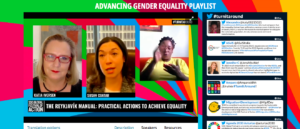
Challenging Stereotypes
The Reykjavík Manual calls on society to challenge harmful gender stereotypes and negative perceptions of women in leadership, as well as support a healthier view of masculinity.
Evidence from the Reykjavík Index found that young men are becoming less supportive of women as leaders overall. To address this predicament, Katja Iversen introduced Lekan Aleshe, a Yale Young Global Scholar from Nigeria.
As a young man and leader, Lekan Aleshe acknowledged the evidence of societal biases in Nigeria, an obstacle for women seeking to participate in the political sector and other positions of leadership.
“The Reykjavík Manual says we should take a step back and look about how we perceive women in power. I think that is the best step. I think if we move back, we can see if we have biases.” He continued, “How do we, as young men and boys, feel when we see a powerful woman? When we find that answer, we can move upon that and that is when change can start to happen.”
To elevate the voices of women in his environment, Lekan Aleshe pointed to the power of conversation and listening.
He emphasised, “The most important thing is just listening. If my friend wants to talk to me about sexism and toxic masculinity, I need to sit down and be ready to understand what she is saying.”
Gender equality means that women and men, boys and girls, enjoy the same rights, protections, resources, and opportunities. Not only must men be included in the conversation, but they must be willing to listen. This involves challenging notions of masculinity and preconceived perceptions of manhood, and engaging as gender advocates.
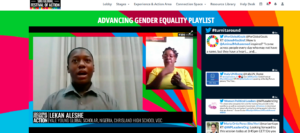
An Invitation to Build Back Better Together
Katja Iversen concluded the conversation with an open question to all the participants, “What do you want our audience to do today and beyond?”
It was Ambassador Jörundur Valtýsson’s words that resonated among the panel.
“We have an opportunity to build back better and more equal. We know what needs to be done. SDG 5 on gender equality is the guiding light. We have the Reykjavík Manual for all the tools we need,” he said.
With pledges to champion equality throughout all sectors of life, the session commemorated the tremendous efforts by leaders around the world in shaping a more equal future in a COVID-19 world.
